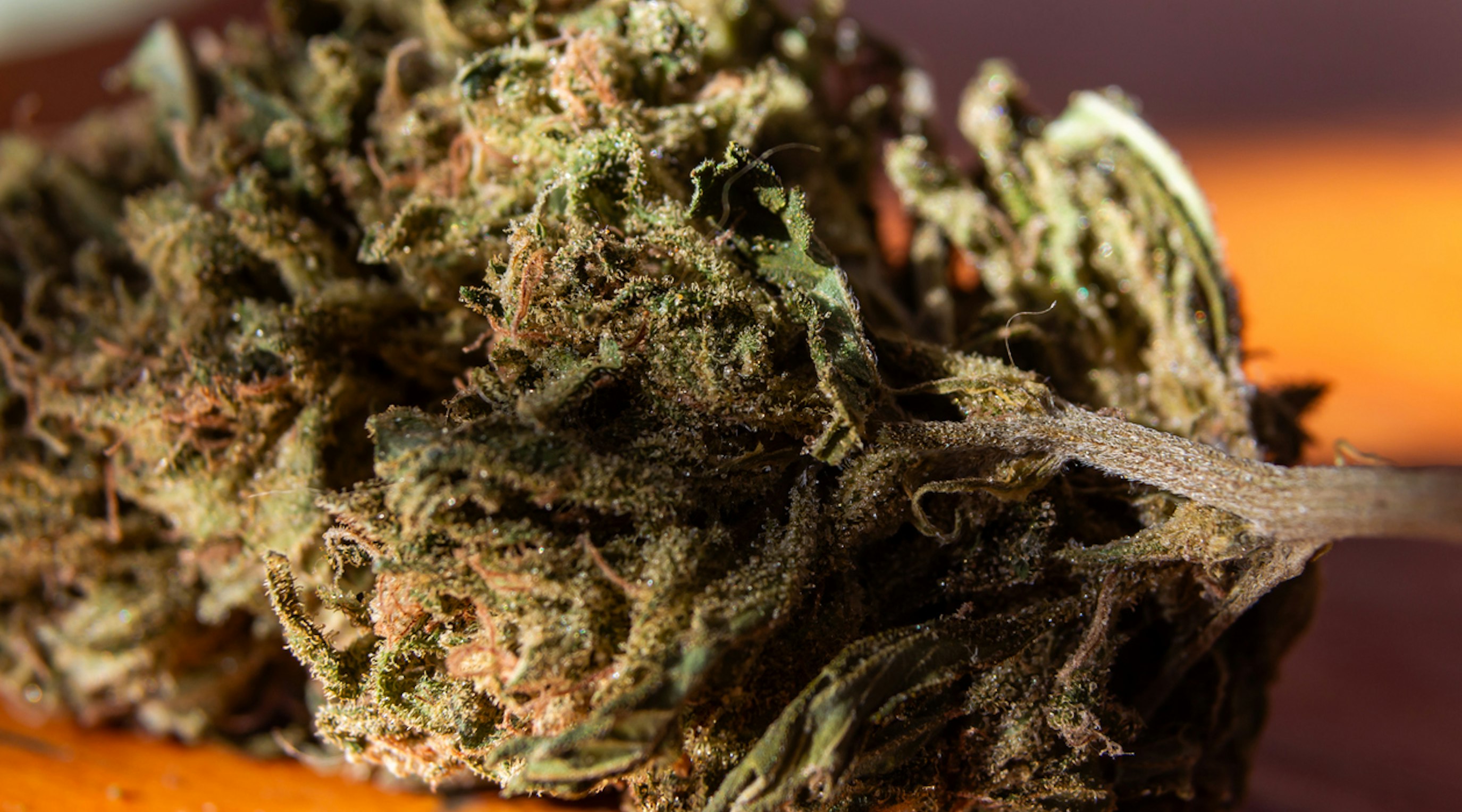Grit weed in the UK: The alarming trend of contaminated street cannabis
8 min read
Editorial Team
Patients may have been made aware of recent reports that cannabis from the illicit market has been contaminated. These reports about “grit weed” have been shared across social media networks but the exact details of the adulterant are yet to be formally determined.
Contents
Patients may have been made aware of recent reports that cannabis from the illicit market has been contaminated. These reports about “grit weed” have been shared across social media networks but the exact details of the adulterant are yet to be formally determined.
What is grit weed?
Grit weed is cannabis contaminated with particulate matter. It could be iron, glass, sand, salt, a chemical or something else. Images circulating about the current batch suggest it looks like some form of salt. Salt could be an unlimited number of kinds of contamination, from table salt to different crystalline chemicals. Grit weed is considered dangerous and harmful to human health and should be avoided.
Where is grit weed being found in the UK?
Grit weed was reported in England, Wales, Northern Ireland, and Scotland in the campaign to raise awareness. Reports of contaminated cannabis with photographic and video evidence backing up the claims indicate that this cannabis is being found all over the UK. The original alert came from a patient in Oswestry, Shropshire. More reports flooded in from Wrexham, Manchester, Cheshire, Birmingham, Worthing, Brighton, Eastbourne, Hastings, Reading, Basingstoke, Cardiff, Luton, Sheffield, Nottingham, Teesside, Aberdeen, Edinburgh, Glasgow, Cornwall, Portsmouth, London, Essex and Bristol.
Why & how is grit weed happening in the UK?
Particle contamination adds weight to the cannabis, which increases the profits for the person who added it. It is added during the cultivation stage, where flowers can grow over it, making it harder for consumers to detect. Commercial growers looking to profit, who do not care about the product or consumers, are to blame for this kind of criminal behaviour, and this is the very reason the government tightly regulates who can grow cannabis.
Because cannabis remains illegal outside of its use as a controlled unlicensed prescription medicine, there is no supervision or regulation when it is produced or sold illegally, leaving it possible to exploit consumers with harmful products in the name of increased profits.
The UK has a history of contaminated illegal cannabis. In the mid-2000s, there was a grit weed epidemic that lasted approximately four years. The source was imported cannabis from the Netherlands.
What does grit weed look like?
Visually, the contaminant makes the flowers look like they have a high level of trichome coverage, suggesting that they are strong and healthy. On closer inspection, the trichomes are not as you would expect. Rather than appearing as round globes on stalks like lollipops and mushrooms, what can be seen is a coating of contamination with sharp edges and no regular shape. The crystal-like structures are opaque and can be seen inside the flowers when broken up. Rather than looking natural, it looks like the flowers are artificially encrusted.
What are the dangers and consequences of using grit weed?
Inhaling unknown substances and burning or hot particulates like glass, metal, and sand can cause irreversible scar tissue damage to the respiratory system that cannabis would not normally cause. Burning salt can create chloride gas, which is harmful to breathe in.
What are the symptoms that you have been using grit weed?
You may have been exposed to grit weed if you have used cannabis recently and developed a stronger and more persistent cough than usual. You may feel tight in your chest, or your breathing has become louder. Avoid using this cannabis and take note to see if the symptoms are reduced. If they do not, you may want to speak to your GP.
How to identify grit weed
The current trend of salty weed can sometimes be identified by the white salts that have fallen off and collected in the corner of the baggy or bottom of a glass jar. If you shake it and see a white crystalline substance piling up, it is a sign of contamination. Do not use it.
Sugar weed has been soaked in sugar water and left to dry. The sugar crystalises inside the flower and causes it to have sugar all the way through. Breaking the buds makes them look white all the way through. Do not use it. Inhaling hot sugar is dangerous.
What are the side effects of using grit weed?
The side effects of using grit weed can cause irreversible damage to your lungs and respiratory system. The reason the government regulates medical cannabis products is to ensure patients avoid the harmful consequences of contaminated weed from street suppliers and only use prescribed medical cannabis products.
What should you do if you find grit weed?
If you find grit weed of any kind, you should avoid using it. If you are a patient, check the eligibility checker to see if you qualify for a legal prescription of regulated medicinal cannabis from a specialist doctor.
Contamination of this kind will never be found in legal medical cannabis due to licences for production being granted by government departments and multiple stages of checks and lab testing to ensure consumer safety standards are met. It is one of the many benefits of regulating cannabis production and sales. If you weren’t sure why medical cannabis needed to be regulated before, hopefully now you can see the reality of the minefield patients have had to navigate for so many years.
Know the facts: Unregulated cannabis & consumer safety.
The challenge for consumers is that the unregulated illicit cannabis market has no regulation and no safety network. There is no organisation to oversee product safety and ensure consumers come to no harm, and producers are prevented from being sued. As a result, it becomes the job of consumers to raise the alarm and try to spread harm reduction and consumer safety awareness when they stumble upon contaminated cannabis.
Why is it important to talk about the contaminated cannabis crisis?
Medical cannabis was legalised to provide safe access to patients who rely on THC and other cannabinoid treatments. With only 30,000 active cannabis patients in the UK and the lower estimate of patients being 1 million, it is safe to conclude that there are 970,000 patients in the UK still purchasing their cannabis from alternative sources.
Releaf has previously discussed the hidden dangers of street cannabis to help make people aware of some of the harmful things found in and relating to unregulated supplies. These risks are often unheard of by people using it as medicine to treat serious conditions. When they find out there could be contaminants in their medicine, it often makes them reconsider their options.
Releaf’s investigations into the public knowledge of medical cannabis concluded only 34% of the population knew it was available on prescription with a further 23% being unsure if it is or not, indicating there will be many patients who still don’t know about their legal options.
By speaking about it, we might help make more patients aware of the risks and harms related to contaminated street cannabis.
Why do patients choose illicit cannabis over legal prescription cannabis?
There are a few reasons why many patients haven’t made the switch to medical cannabis.
- They believe it is unaffordable
- They feel like they will have reduced choice
- They grow their own
- They do not realise medical cannabis is legal.
- They have heard bad things, and it has put them off.
Measures are in place to ensure prescription cannabis is free from pesticides, heavy metals and harmful chemicals. For someone with a compromised immune system, a neurological disorder, gastrointestinal issues, liver or kidney function problems, these kinds of hidden dangers pose a much greater risk with more harmful consequences. For people without these kinds of diagnoses, it could cause long-term health problems relating to these parts of the body.
- All medical cannabis products are grown under strict government-licenced conditions and are tested to ensure medical consumer safety standards are met.
- If you know someone with a genuine medical condition still sourcing their medicine from the illicit market, send them this article so they can make an informed decision.
- Medical cannabis products have improved since they first came to market in the UK; you might be surprised by the availability if you take a fresh look.
Overview
Illicit street cannabis has hidden health risks. Since September 2023, there have been reports of contaminated cannabis in most parts of England, with some in Wales and Scotland. The contamination is as yet unknown but is being investigated by independent researchers. Avoid it if you come into contact with it. If you believe you have a genuine medical need for a cannabis prescription, take our eligibility checker to see if you qualify.
At Releaf, we believe that access to medical cannabis is important. That's why we offer tailored monthly packages based on your cannabis prescription, specialist consultations for medical cannabis, and a unique medical cannabis card for protection.
Share article
Did you like this article?
It is important to seek medical advice before starting any new treatments. The patient advisors at Releaf are available to provide expert advice and support. Alternatively, click here to book a consultation with one of our specialist doctors.
Elevate your wellness with medical cannabis
Get comprehensive care, convenience, and confidence with an all-in-one treatment plan.
Am I eligible?Authors
Editorial Team
Article written by the Releaf Editorial Team, a group of seasoned experts in cannabis healthcare, dedicated to enhancing awareness and accessibility in the field through their wealth of knowledge and experience.
compliance checked
Compliance Director
Editorial Policy
All of our articles are written by medical cannabis experts, guided by strict sourcing guidelines, and reference peer-reviewed studies and credible academic research. Our expert clinical team and compliance specialists provide valuable insights to ensure accuracy when required. Learn more in our editorial policy.
Need more help?











